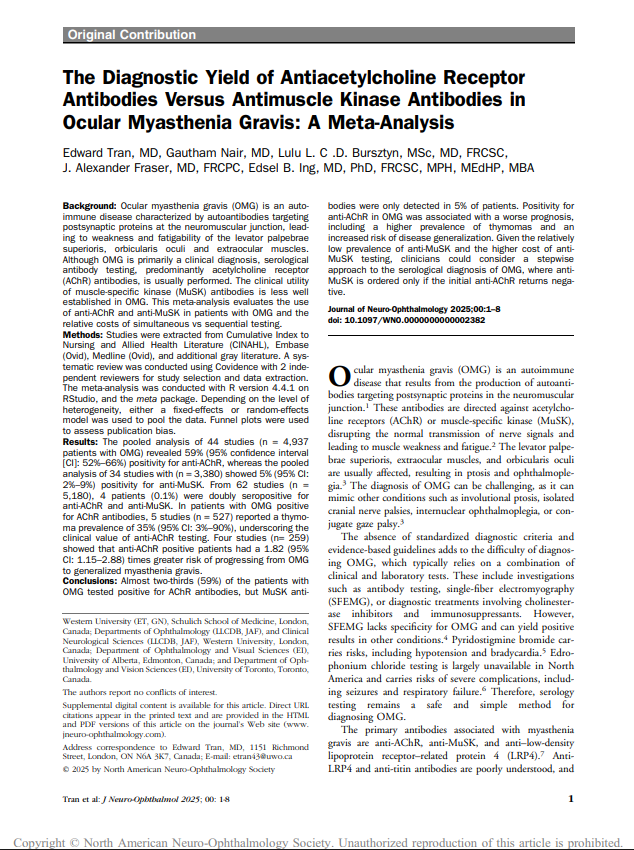The Diagnostic Yield of Antiacetylcholine Receptor Antibodies Versus Antimuscle Kinase Antibodies in Ocular Myasthenia Gravis: A Meta-Analysis
August 2025
Abstract
Background:
Ocular myasthenia gravis (OMG) is an autoimmune disease characterized by autoantibodies targeting postsynaptic proteins at the neuromuscular junction, leading to weakness and fatigability of the levator palpebrae superioris, orbicularis oculi and extraocular muscles. Although OMG is primarily a clinical diagnosis, serological antibody testing, predominantly acetylcholine receptor (AChR) antibodies, is usually performed. The clinical utility of muscle-specific kinase (MuSK) antibodies is less well established in OMG. This meta-analysis evaluates the use of anti-AChR and anti-MuSK in patients with OMG and the relative costs of simultaneous vs sequential testing.
Methods:
Studies were extracted from Cumulative Index to Nursing and Allied Health Literature (CINAHL), Embase (Ovid), Medline (Ovid), and additional gray literature. A systematic review was conducted using Covidence with 2 independent reviewers for study selection and data extraction. The meta-analysis was conducted with R version 4.4.1 on RStudio, and the meta package. Depending on the level of heterogeneity, either a fixed-effects or random-effects model was used to pool the data. Funnel plots were used to assess publication bias.
Results:
The pooled analysis of 44 studies (n = 4,937 patients with OMG) revealed 59% (95% confidence interval [CI]: 52%–66%) positivity for anti-AChR, whereas the pooled analysis of 34 studies with (n = 3,380) showed 5% (95% CI: 2%–9%) positivity for anti-MuSK. From 62 studies (n = 5,180), 4 patients (0.1%) were doubly seropositive for anti-AChR and anti-MuSK. In patients with OMG positive for AChR antibodies, 5 studies (n = 527) reported a thymoma prevalence of 35% (95% CI: 3%–90%), underscoring the clinical value of anti-AChR testing. Four studies (n= 259) showed that anti-AChR positive patients had a 1.82 (95% CI: 1.15–2.88) times greater risk of progressing from OMG to generalized myasthenia gravis.
Conclusions:
Almost two-thirds (59%) of the patients with OMG tested positive for AChR antibodies, but MuSK antibodies were only detected in 5% of patients. Positivity for anti-AChR in OMG was associated with a worse prognosis, including a higher prevalence of thymomas and an increased risk of disease generalization. Given the relatively low prevalence of anti-MuSK and the higher cost of anti-MuSK testing, clinicians could consider a stepwise approach to the serological diagnosis of OMG, where anti-MuSK is ordered only if the initial anti-AChR returns negative.

